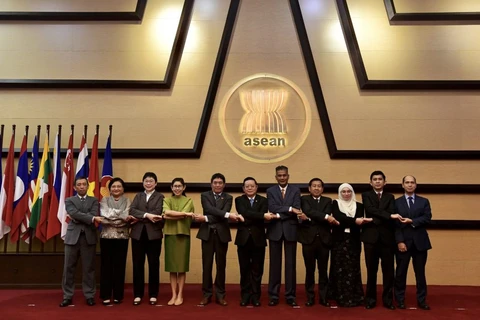 Coordinating Minister for Maritime Affairs and Investment, Luhut Binsar Pandjaitan, delivering his remarks at the Indonesian Pavilion during the World Economic Forum Annual Meeting 2023 in Davos, Switzerland on January 17, 2023. (Photo: ANTARA)
Coordinating Minister for Maritime Affairs and Investment, Luhut Binsar Pandjaitan, delivering his remarks at the Indonesian Pavilion during the World Economic Forum Annual Meeting 2023 in Davos, Switzerland on January 17, 2023. (Photo: ANTARA) Jakarta (VNA) – Indonesian Coordinating Minister for Maritime Affairs and Investment Luhut Binsar Pandjaitan has informed that the country will not import fossil fuels from 2045 as it will develop the potential of palm oil as an alternative fuel by then.
Speaking at a sideline event of the World Economic Forum (WEEF) Annual Meeting 2023 in Davos, Switzerland, he said Indonesia is currently researching the potential of palm oil and the country is aiming to produce around 100 million tonnes of palm oil by 2045.
The minister revealed that at least 30% of palm oil production will be used for the food industry, while the remaining 70% will be used to manufacture ethanol, hence, the country will not need to import fossil fuel from 2045.
He said that the development of alternative fuels is one of the five green economy pillars whose implementation is being intensified by Indonesia.
The other four pillars are the decarbonisation of the electricity sector, the utilisation of low-carbon transportation, the development of green industry, and the strengthening of carbon sink.
According to Luhut, the transition from fossil energy to renewable energy would encourage the realisation of net-zero emissions by 2060, therefore, the utilisation of the derivative products of palm oil will have big impacts in the upcoming years.
He acknowledged that the Indonesian government has put a moratorium on oil palm plantation permits, thus the productivity of the plantations can be increased from 2.3 tonnes per hectare to 8–10 tonnes per hectare in the next 10–15 years.
In addition, the moratorium policy aims to reduce deforestation due to the expansion of oil palm plantations.
Furthermore, as the world’s largest crude palm oil (CPO) producer in the world, Indonesia has also implemented a mandatory programme to push the use of CPO-based biodiesel since 2008. The mandatory programme aims to cut imports of fossil fuels, increase the use of renewable energy, as well as minimise emissions from the use of fossil fuels, he added./.






















